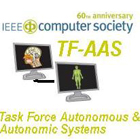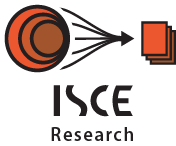First IEEE International Conference on Self-Adaptive and Self-Organizing Systems
Boston, Mass., USA, July 9-11, 2007
Welcome

The complexity of current computer systems has led the software engineering, distributed systems and management communities to look for inspiration in diverse fields (e.g., robotics, artificial intelligence or biology) to find new ways of designing and managing networks, systems and services. In this endeavor, self-organization and self-adaptation have emerged as two promising facets of a paradigm shift.
Self-adaptive systems work in a top-down manner. They evaluate their own global behavior and change it when the evaluation indicates that they are not accomplishing what they were intended to do, or when better functionality or performance is possible. Such systems typically operate with an explicit internal representation of themselves and their global goals.
Self-organizing systems work bottom-up. They are composed of a large number of components that interact according to simple and local rules. The global behavior of the system emerges from these local interactions, and it is difficult to deduce properties of the global system by studying only the local properties of its parts. Such systems do not use internal representations of global properties or goals; they are often inspired by biological or sociological phenomena.
The aim of this conference series is to provide a forum for laying the foundations of a new principled approach to engineering systems, networks and services based on self-adaptation and self-organization. Achieving this requires the development of theories, frameworks, methodologies, tools, middleware, testbeds, best practices, etc. SASO will gather participants with different backgrounds to foster cross-pollination between different research fields and encourage technology transfers
Topics
- Self-* properties: self-organization, self-adaptiveness, self-management, self-monitoring, self-tuning, self-repair, self-configuration, etc.
- Theories of self-organization and self-adaptation
- Frameworks and methods of self-management
- Metrics for assessing self-* properties
- Simulations, tools and testbeds for self-*
- Debugging, testing and evaluation of self-* systems
- Decision making in self-* systems
- Management and control of self-* systems
- Robustness and dependability of self-* systems
- Engineering and control of emergent properties in self-* systems
- Design of high-level goals from local interactions
- Analytical models of self-organization and emergent behavior
- Biologically inspired interaction mechanisms
- Social and economics inspired approaches
- Case studies and experience reports
Systems and Technologies
- Peer-to-peer (P2P) applications
- Mobile robots
- Sensor networks, mobile ad hoc networks (MANETs)
- Grids
- Embedded systems, ubiquitous computing
- Autonomic computing and communications
- Computer networks, telecom networks
- Multi-agent systems
- E-business systems and services
- Complex adaptive systems
Research Communities
- Distributed artificial intelligence
- Networking
- Software engineering
- Distributed systems
- Integrated management
- Robotics
- Knowledge-based systems
- Machine learning
- Control theory
- Mathematical optimization










